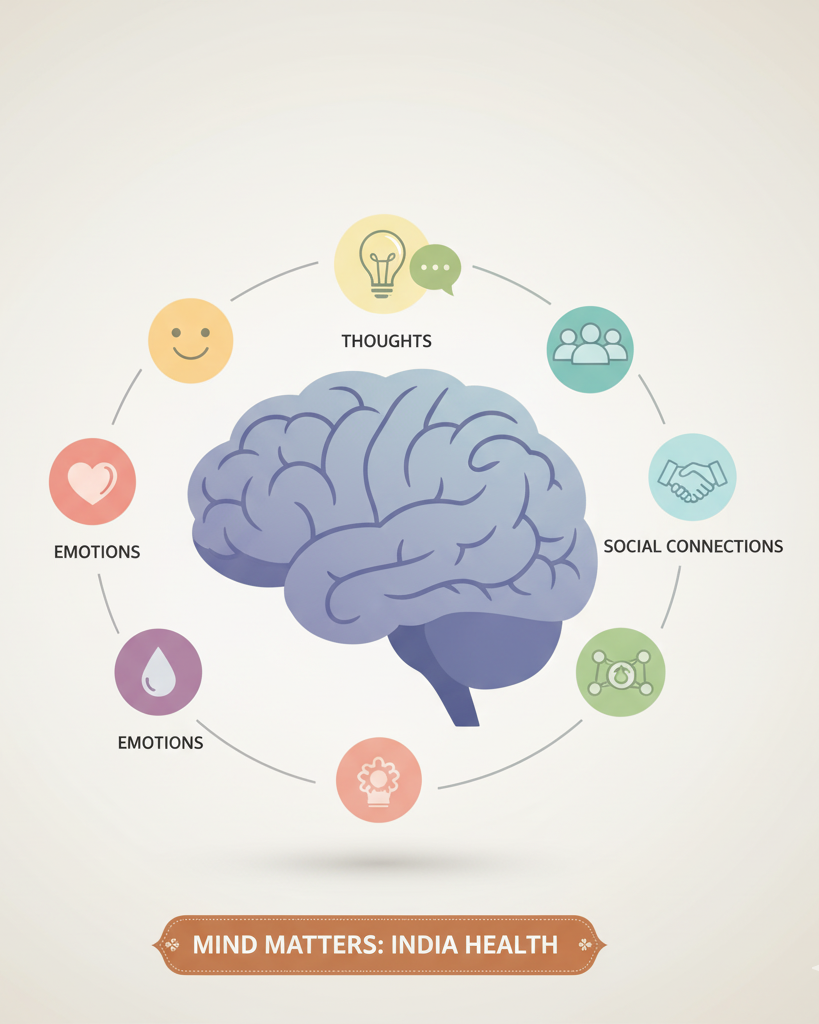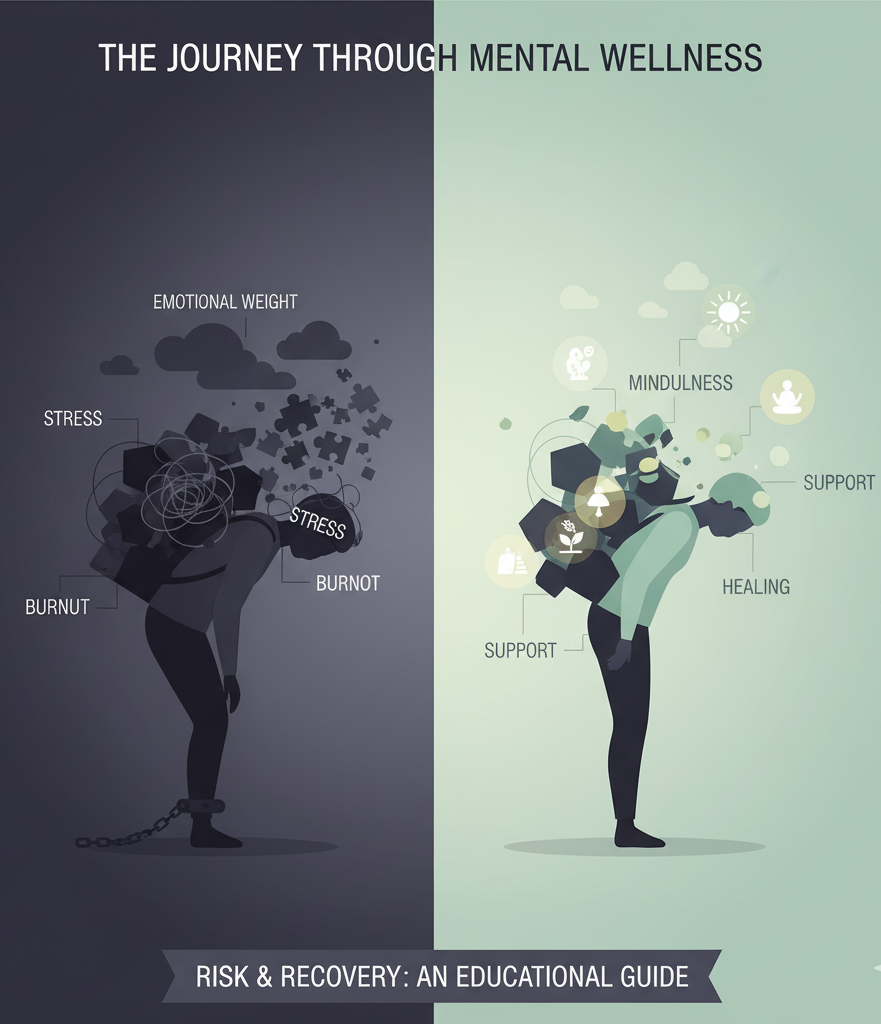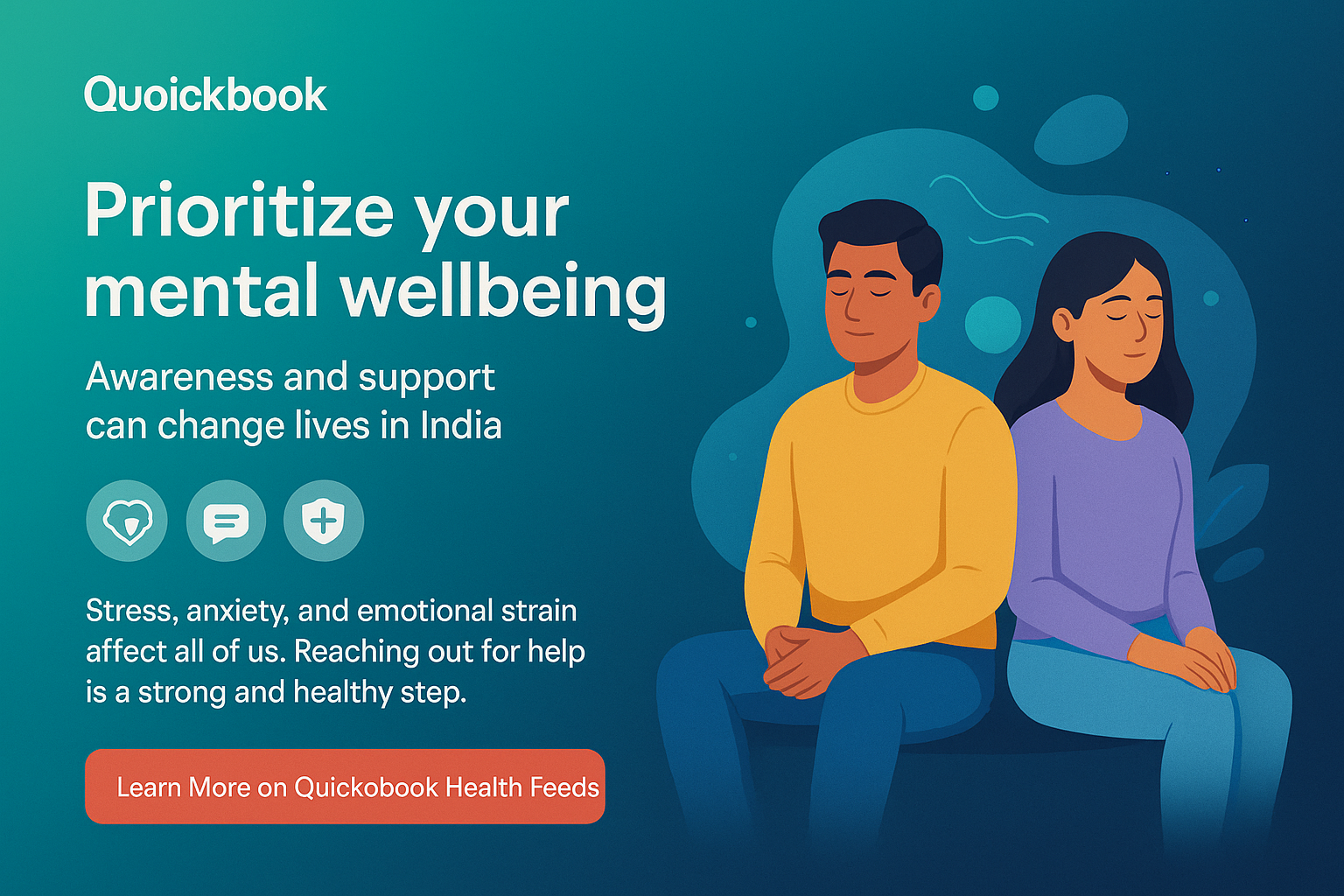Introduction
Mental health plays a vital role in shaping our thoughts, emotions, and daily functioning. Yet, in India, mental health awareness is still developing. Many people continue to suffer in silence due to stigma, lack of knowledge, and limited access to treatment. Whether it’s stress from work, academic pressure, relationship concerns, financial struggles, or biological factors, mental health issues can affect anyone, regardless of age, gender, or background.
Studies suggest that one in seven Indians will experience a mental health condition at least once in their life. This is a major public health concern, but the good news is that awareness is increasing, and more people are now open to seeking help. Understanding mental health and knowing where to get the right mental illness treatment can significantly improve quality of life.
This guide breaks down mental health concepts in simple, patient-friendly terms for Indian readers.
What Is Mental Health?

Mental health refers to how we think, feel, and behave. It influences how we cope with challenges, handle relationships, make decisions, and manage stress. Good mental health does not mean we are always happy—it means we can understand our emotions and bounce back during difficulties.
Mental health includes:
-
Emotional well-being
-
Psychological balance
-
Social functioning
-
Ability to manage stress
-
Healthy relationships
When any of these areas get affected for several weeks or months, it may signal a mental health concern.
Why Mental Health Awareness Matters in India
India is progressing rapidly, but mental health awareness still lags behind due to cultural stigma and lack of conversations around emotional well-being. Many people believe mental health issues are a sign of weakness or something to hide. This makes individuals avoid therapy or delay treatment, which can worsen symptoms.
Raising awareness helps people:
-
Recognize symptoms early
-
Understand that mental illness is treatable
-
Support loved ones without judgment
-
Seek professional help confidently
With awareness programs, social media campaigns, and celebrity advocacy, India is gradually becoming more open about mental health, but there is still a long way to go.
Common Mental Health Conditions in India
Depression
A long-term feeling of sadness, hopelessness, or lack of interest in activities for more than two weeks. It affects mood, sleep, appetite, and energy levels.
Anxiety Disorders
Characterized by excessive fear or worry. Physical signs include sweating, restlessness, racing thoughts, trembling, or rapid heartbeat.
Stress-Related Conditions
Common among students, working professionals, caregivers, and homemakers. High stress can lead to burnout, irritability, and sleep issues.
Bipolar Disorder
A condition in which a person experiences extreme mood swings—from high-energy mania to low-energy depression.
Schizophrenia
A severe mental disorder that affects thinking, behaviour, and perception. Symptoms include hallucinations, delusions, and confused speech.
Obsessive-Compulsive Disorder (OCD)
Repeated unwanted thoughts (obsessions) and repetitive behaviours (compulsions).
Post-Traumatic Stress Disorder (PTSD)
Occurs after traumatic events like accidents, violence, abuse, or disasters.
Causes of Mental Health Issues in India
Mental health concerns arise from a combination of:
Biological Factors
-
Genetics
-
Brain chemistry issues
-
Hormonal changes
Psychological Factors
-
Childhood trauma
-
Persistent stress
-
Low emotional resilience
Social and Cultural Factors
-
Competition and academic pressure
-
Family expectations
-
Workplace stress
-
Relationship conflicts
-
Stigma and social judgment
Lifestyle Factors
-
Poor sleep routines
-
Excessive screen time
-
Lack of exercise
-
Unhealthy diet
-
Addictions or substance use
ALSO READ: Women’s Health Issues Every Indian Woman Should Know
Symptoms of Mental Health Problems
Symptoms differ based on the condition, but common signs include:
Emotional Symptoms
-
Sadness or emptiness
-
Anger or irritability
-
Feeling overwhelmed
-
Hopelessness
Physical Symptoms
-
Fatigue
-
Headaches
-
Appetite changes
-
Sleep issues
Behavioral Symptoms
-
Avoiding social interactions
-
Poor work or academic performance
-
Loss of interest in hobbies
Cognitive Symptoms
-
Difficulty concentrating
-
Negative or intrusive thoughts
-
Indecisiveness
-
Memory issues
How Mental Health Conditions Are Diagnosed

Diagnosis involves:
-
A detailed evaluation by a psychiatrist
-
Psychological tests
-
Symptom discussion
-
Understanding lifestyle and stress factors
-
Sometimes, medical tests to rule out other causes
Diagnosis is not a label—it is a guide to the right treatment plan.
Mental Illness Treatment Options in India
Treatment depends on the severity and type of condition. The main options include:
Counselling or Psychotherapy
Effective for anxiety, depression, stress, trauma, relationship issues, and mild-to-moderate disorders.
Types include:
-
Cognitive Behavioral Therapy (CBT)
-
Dialectical Behaviour Therapy
-
Family counselling
-
Talk therapy
Medications
Prescribed by a qualified psychiatrist.
Used for:
-
Depression
-
Bipolar disorder
-
Schizophrenia
-
Anxiety disorders
Never self-medicate. Dosages depend on the doctor’s prescription.
Lifestyle Modifications
-
Exercise for at least 30 minutes
-
Balanced diet
-
Reduced screen time
-
Good sleep hygiene
-
Yoga and meditation
Support Groups
Provide emotional support and shared experiences.
Hospital-Based or Intensive Care
Needed in cases of severe mental health crises or suicide risk.
Importance of Family and Community Support
Family support plays a key role in recovery. A caring and understanding environment helps reduce stress and improves treatment success.
Family can help by:
-
Listening without judgment
-
Encouraging professional treatment
-
Avoiding negative comments
-
Supporting healthy habits
-
Understanding the condition instead of blaming the person
India’s strong family system can be a major advantage if stigma is reduced.
How to Protect Your Mental Health
Some preventive steps include:
-
Maintaining a healthy routine
-
Identifying stress triggers
-
Talking about emotions openly
-
Avoiding overworking
-
Taking regular breaks
-
Practicing meditation
-
Limiting alcohol or substance use
When to Consult a Doctor
Professional help is needed when:
-
Symptoms last more than two to three weeks
-
Stress affects daily activities
-
Sleep is consistently disturbed
-
You experience panic attacks or severe anxiety
-
You feel hopeless or helpless
-
You have thoughts of self-harm
-
Behaviour changes dramatically
Early help prevents complications and improves outcomes.
Risks of Ignoring Mental Health

Ignoring symptoms can lead to:
-
Worsening depression or anxiety
-
Substance abuse
-
Unhealthy relationships
-
Low productivity
-
Chronic health issues
-
Self-harm behaviours
-
Poor quality of life
Mental health is health—ignoring it can have long-term consequences.
50 Frequently Asked Questions (FAQs)
Q1. What is mental health?
A: It refers to emotional and psychological well-being.
Q2. What causes mental illness?
A: Genetics, stress, trauma, chemical imbalance.
Q3. Can mental illness be treated?
A: Yes, with therapy and/or medication.
Q4. What is depression?
A: A mood disorder causing long-term sadness.
Q5. What are early signs of anxiety?
A: Restlessness, worry, fast heartbeat.
Q6. How is mental illness diagnosed?
A: Through evaluation by a psychiatrist.
Q7. Can therapy alone help?
A: Yes, for mild-to-moderate issues.
Q8. Do psychiatric medicines cause addiction?
A: No, most are non-addictive.
Q9. Can children have mental illness?
A: Yes, conditions like ADHD and anxiety occur.
Q10. How does stress impact the body?
A: It causes headaches, fatigue, and sleep issues.
Q11. What is bipolar disorder?
A: A condition with extreme mood swings.
Q12. Are mental health issues common in India?
A: Yes, affecting millions.
Q13. Does meditation help mental health?
A: Yes, it reduces stress.
Q14. Can diet affect mental health?
A: Yes, nutrient-rich foods improve mood.
Q15. How much sleep is needed?
A: Adults need 7–8 hours daily.
Q16. Is stigma still a barrier?
A: Yes, especially in rural areas.
Q17. What is OCD?
A: A disorder with repeated thoughts and behaviours.
Q18. Can exercise reduce anxiety?
A: Yes, physical activity releases endorphins.
Q19. What is PTSD?
A: A condition after trauma.
Q20. What is psychotherapy?
A: Talk-based treatment.
Q21. What is CBT?
A: Therapy that changes negative thinking patterns.
Q22. Are online consultations effective?
A: Yes, widely used in India.
Q23. Should I see a therapist or psychiatrist?
A: Therapist for counselling; psychiatrist for medications.
Q24. What age group faces the most stress in India?
A: Students and working youth.
Q25. Can overthinking be a symptom?
A: Yes, often linked to anxiety.
Q26. What is social anxiety?
A: Fear of social situations.
Q27. Can mental illness affect physical health?
A: Yes, increases risk of chronic diseases.
Q28. Is loneliness a mental health issue?
A: It can lead to depression.
Q29. Can relationships affect mental health?
A: Yes, toxic relationships cause emotional strain.
Q30. How to calm a panic attack?
A: Deep breathing, grounding techniques.
Q31. What is schizophrenia?
A: A disorder affecting thinking and perception.
Q32. Can mental illness run in families?
A: Yes, genetic risk exists.
Q33. Is self-harm a sign of mental illness?
A: Yes, requires immediate help.
Q34. What is mood disorder?
A: Conditions affecting emotional state.
Q35. What is a mental health emergency?
A: Suicidal thoughts, violent behaviour, or severe confusion.
Q36. What is substance-induced mental illness?
A: Issues caused by alcohol or drugs.
Q37. Are therapy sessions confidential?
A: Yes, fully private.
Q38. How often should sessions be?
A: Weekly or as advised by the therapist.
Q39. Can financial stress cause depression?
A: Yes, very common in India.
Q40. Can mobile addiction affect mental health?
A: Yes, leads to anxiety and sleep issues.
Q41. What is burnout?
A: Exhaustion from long-term stress.
Q42. What is emotional exhaustion?
A: Feeling drained and overwhelmed.
Q43. Can students get therapy?
A: Yes, many benefit from counselling.
Q44. Can mental illness affect marriage?
A: Yes, communication and support are important.
Q45. Can lack of sleep cause anxiety?
A: Yes, sleep is essential for emotional balance.
Q46. What is a coping mechanism?
A: Strategies to handle stress.
Q47. Are there free mental health services in India?
A: Yes, some NGOs and hospitals provide support.
Q48. Can addiction worsen mental health?
A: Yes, leads to mood and behavioural issues.
Q49. What is grief disorder?
A: Intense sadness after loss.
Q50. When should I seek help urgently?
A: If you have suicidal thoughts or severe distress.
Conclusion
Mental health is just as important as physical health. In India, increasing awareness helps people understand that mental illness is not a weakness—it is a medical condition that can be treated. With the right mix of counselling, medication, lifestyle changes, and support, most people recover or learn to manage their symptoms effectively. Early recognition and treatment can make a huge difference.
Quickobook CTAs
-
Book a therapist or psychiatrist near you on Quickobook.
-
Get affordable online consultations from trusted mental health experts.
-
Find verified clinics and doctors in your city instantly.
Disclaimer
This blog is for educational purposes only. It does not replace professional medical advice, diagnosis, or treatment. Always consult a qualified psychiatrist or therapist for personalized guidance.









Comments (0)
No comments yet. Be the first to share your thoughts!
Leave a Comment